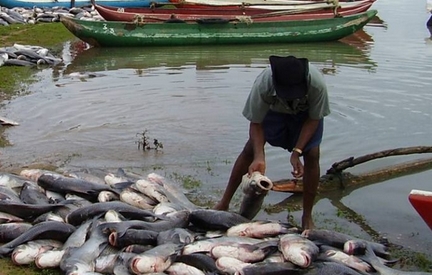
support@yorubalibrary.com
+2348073529208, 07038599574

The Yoruba people, primarily located in southwestern Nigeria, have a rich cultural heritage that includes various traditional livelihoods. Among these, fishing holds a significant place, especially for communities living along the coastlines and riverbanks. Yoruba traditional fishing communities are not just centers of economic activity but also hubs of cultural and social life.
Historical Overview
Fishing has been a cornerstone of livelihood for many Yoruba communities for centuries. The geographical landscape, featuring numerous rivers, lagoons, and a long Atlantic coastline, has naturally supported the development of fishing as a primary occupation. Historical records and oral traditions highlight the importance of fishing in sustaining Yoruba communities and shaping their way of life.
Fishing Techniques and Practices
Yoruba traditional fishing methods are a blend of skill, knowledge, and sustainable practices passed down through generations. Common fishing techniques include:
• Casting Nets: Fishermen cast nets from small boats or the shore, catching a variety of fish species.
• Fish Traps: Ingenious traps made from reeds and other natural materials are placed in strategic locations to capture fish.
• Hook and Line: This method involves using baited hooks attached to lines, which are either held by hand or set with poles.
These methods are often environmentally sustainable, ensuring that fish populations remain healthy and abundant for future generations.
The Role of Women in Fishing Communities
In Yoruba fishing communities, women play crucial roles. While men typically engage in the actual fishing, women are responsible for processing, preserving, and selling the catch. They smoke or dry fish to prevent spoilage and increase shelf life, a practice essential in the days before modern refrigeration. Women also dominate local markets, where they sell fish and other seafood, contributing significantly to the local economy.
Cultural Significance
Fishing is not just an economic activity but also a cultural one. Many Yoruba festivals and rituals are linked to the sea and rivers, honoring deities believed to protect fishermen and ensure bountiful catches. Festivals such as the Olokun Festival celebrate the sea goddess Olokun, seeking her blessings for safety and prosperity in fishing endeavors.
Challenges Facing Yoruba Fishing Communities
Despite their rich heritage and significant contributions to local economies, Yoruba fishing communities face several challenges:
• Environmental Degradation: Pollution and industrial activities have led to the depletion of fish stocks and the destruction of natural habitats.
• Climate Change: Rising sea levels, changing weather patterns, and other effects of climate change threaten traditional fishing practices.
• Modernization: The encroachment of modern fishing techniques and commercial enterprises can undermine traditional methods and the sustainability of fish populations.
Efforts to Preserve Traditional Fishing
There are ongoing efforts to preserve and support Yoruba traditional fishing practices. These include:
• Sustainable Fishing Initiatives: Programs aimed at promoting environmentally friendly fishing techniques and protecting aquatic ecosystems.
• Cultural Heritage Projects: Initiatives that document and celebrate the cultural aspects of fishing, ensuring that traditions are passed down to younger generations.
• Economic Support: Providing resources and support to fishing communities to improve their livelihoods and adapt to modern challenges while preserving traditional practices.
Conclusion
Yoruba traditional fishing communities are a vital part of the region's cultural and economic fabric. Their sustainable practices, cultural significance, and the pivotal roles played by both men and women highlight the richness of Yoruba heritage. Preserving these communities and their way of life is crucial for maintaining the cultural diversity and ecological balance of the region.

Learn about the Yoruba concept of Ìwà Pẹ̀lẹ́ (good…

Learn special praises for Divine Being and Creator…